LANDSCAPE PROS - 2-Stroke engines and the benefits of maintenance and repair
20 Sept 2021 Kawasaki Community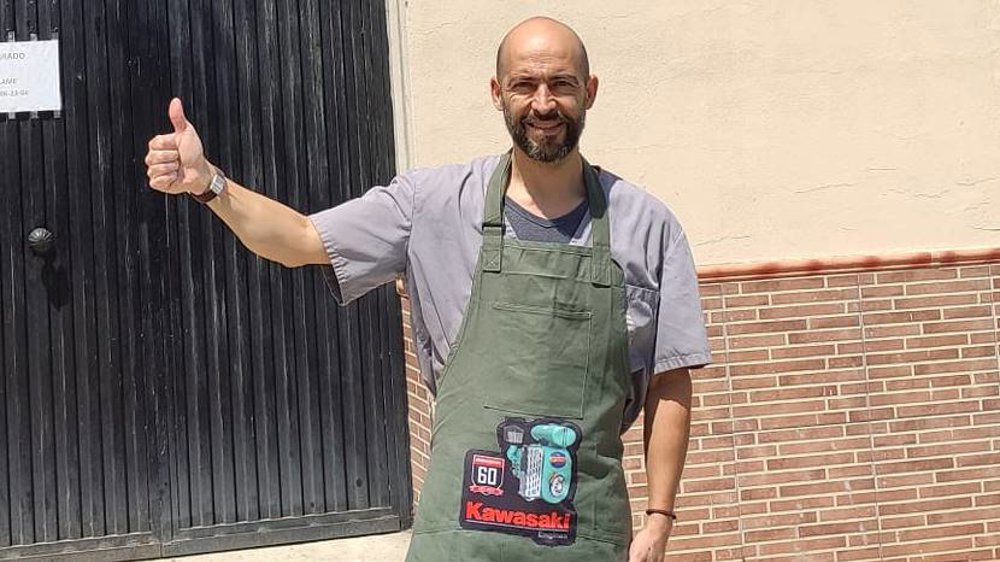
António Jimenez Alvarez knows a lot about engines. He is the owner of AgroMotions, an independent mechanic business based in Andalusia, Spain, selling to and repairing equipment for the farming and the gardening industries. Since 2015, António has also been a Kawasaki Genuine Parts partner. A passion for motorcycle engines initially drove him into this career in which he has extensive experience, as you will read from his many insights below.
In this article António tells us about his business, about the role of maintenance in ensuring profitability and the recent rash of unqualified people entering the repair and maintenance market. He also details some of the changes in professional garden and farming equipment that he’s seeing as well as his advice for maintaining 2-Stroke engines.
About AgroMotions
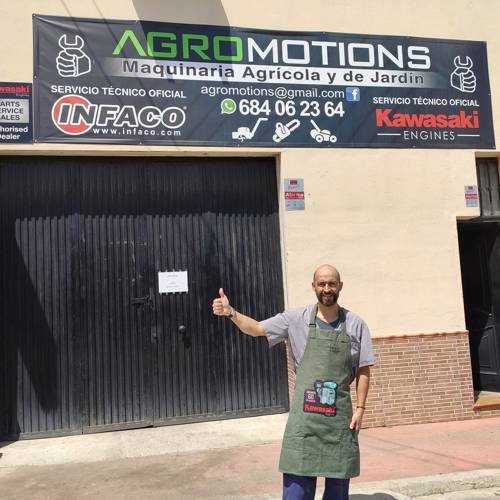
Tell us a bit about your job
I’m a mechanic. I service the garden and farming industry, selling and repairing equipment - 2- and 4-Stroke engines.
Describe your average day
I receive the client, meet them, repair their machine, look for spares, do the invoicing, email them, everything. I have a very small repair shop but have a lot of work to do. I’m a very small, independent business and don’t have any employees.
I hear you have a passion for motorbikes. How did you get into mechanics?
I started by competing, fixing my own motorbikes and repairing them as a hobby. That gave me the knowledge to work with petrol engines and, eventually, I decided to open my own business.

I know your business has been doing very well. How long have you worked in the industry?
I started in industrial mechanics in 1997, working for Siemens as a manufacturing officer at their component factory. After 10 years, I moved to Finance Auto – the Spanish Caterpillar dealer – for five years as a maintenance technician. After that, I set up my own business and it’s been going for six years now.
What are your top products?
Kawasaki Engines 2-Stroke brushcutter engines: the TJ45 and the TJ53 are what I sell the most. My favourites are the TH48, TD40 and TJ53.
There are more channels than ever where we can market ourselves on social media. In what ways do you market yourself?
As a small business owner, I have to use as many tools as I can. I manage my social media accounts myself, but I can’t dedicate as much time as I’d like.
I’ve recently been telling people to leave me Google reviews. Most mechanics don’t worry about that kind of thing. I tell my clients to write about their experience, whether it’s a one-star or a five-star review. To me, the most important thing is that they do it.
You and Kawasaki Engines
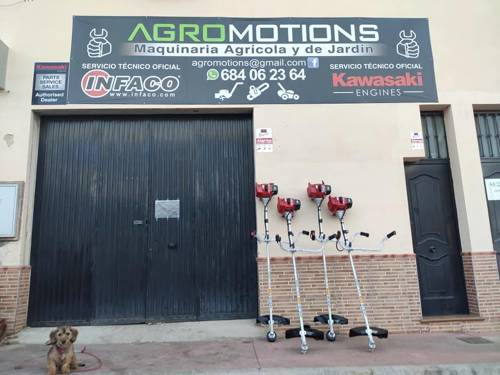
Why are you such a fan of Kawasaki Engines?
Kawasaki Engines are very good value for money. I always try to sell Kawasaki Engines to my clients because it’s a fantastic brand and there are many advantages when compared to other brands.
And do lots of gardeners and farmers use Kawasaki Engines in Spain?
Most businesses like mine use other brands because they’re much easier to sell - not because they’re better, but because there’s a lot more marketing involved in those brands. And that makes it harder for me to sell Kawasaki Engines even though they’re better.
Brands like Viking, Toro and Weibang use Kawasaki engines in their lawn mowers and other machines and I’m able to sell them - because people know those brands.
I’ve been working with a Spanish distributor for six years and have been trying to spread the word about Kawasaki Engines ever since. I’m very loyal!
What is the most important difference between a Kawasaki engine and any other engine? And why should consumers consider them?
Kawasaki engines are very powerful and reliable. They’re professional, high-standard engines and - the best bit - they’re more economical than other brands - better value. For instance, the cost of a Stihl engine, a 4-Mix with an FS130 without a peripheral, is higher than the Kawasaki TJ27 engine.
This also makes them more attractive for renting.
What could Kawasaki Engines do differently?
Kawasaki Engines could create a preventive maintenance kit specifically for each engine. Each kit could include an air filter, a petrol filter and a spark plug. All I would need to do was assemble them. I know I could sell them if they existed.
2-Stroke engines
How long have you been using machines with Kawasaki 2-Stroke engines?
Six years, ever since I opened my business. Since getting in touch with Motogarden - the Kawasaki Engines distributor here in Spain, with whom I have a very good relationship.
Who do you sell 2-Stroke machines to the most?
In my area there’s a lot of clearing businesses, so many professionals come to me about their machines - about 80% of which are powered by 2-Stroke engines.
Most 2-Stroke engines have a three-year lifespan and experience frequent, heavy-duty use over that time. Do you have any advice for increasing lifespan to get the maximum productivity and best value?
Preventive maintenance. It’s critical to keeping an engine in good health.
When preventive maintenance doesn’t happen, in comes corrective maintenance. And when neither of these happen, we get into actual repairs. For those people who do neither, some repairs are not viable for this type of equipment - the cost is just too high.
I give my customers both options: repair the equipment or get a brand new piece of kit as a replacement. Depending on how far gone the equipment is, replacement is usually the best option. If the engine is still under the original warranty I’ll source the new machine for free. Sometimes the issue is so small I don’t even charge for it. It’s just an adjustment. But I’m creating a habit and letting them know it’s not as expensive as it sounds.
So, my advice is to take good care of the engine to avoid having to spend more time and money on corrective repairs, which are usually preventable.
And do people maintain their machines and keep them in good working order?
Unfortunately, preventive maintenance is not a part of Spanish culture - at least in this sector. My clients usually only come to me when their machine is already malfunctioning. I always tell them to do so as soon as something sounds or looks wrong and not force the machine. Sometimes it’s just a matter of changing the air filter or the drive roller.
In my experience, professionals are more methodical. They know the machines and know to bring them to me before the problem gets worse. Non-professionals only come to me when the machine has stopped working completely.
My job is as much about teaching as it is repair! It’s especially helpful to explain the technical terms to my customers - even my international customers. They really appreciate that. A lot of businesses don’t do that, so the client won’t know what they’re referring to. Clients prefer to come to me because I help them understand what’s actually going on with their machine.
Kawasaki engines are very good quality and great value. They withstand a lot more than other brands and have an extended lifespan, but they still need the consumer to look after them properly!
Landscaping tool maintenance
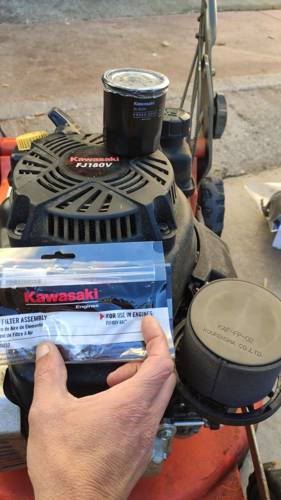
What are the most important tools for engine repairs and maintenance?
Knowledge. If you don’t understand engines, you can’t repair them. You also need to know a little bit of physics and chemistry. Also, just because something isn’t working, doesn’t mean it’s broken, it might just be that the compression ratio is too low, for example.
How important is it to source genuine manufacturer parts for repairs?
First, I need to know I can get my parts when I ask for them. Second, they need to be high quality and work as they should, otherwise repair time is extended, machines break down a lot more quickly which clients don’t like!
I need the manufacturer to be quick and reliable when they supply parts. A gardener can’t leave a garden to grow for 12 weeks - they will need their machine - so I need the parts quickly so I can fix their machine quickly. If they don’t have their machine, they may lose that client and if they don’t make a profit, I don’t get paid either.
What piece of kit would you not be without?
Air filters, diesel filters, spark plugs and clutches. These are the parts with more rotation.
The landscaping business
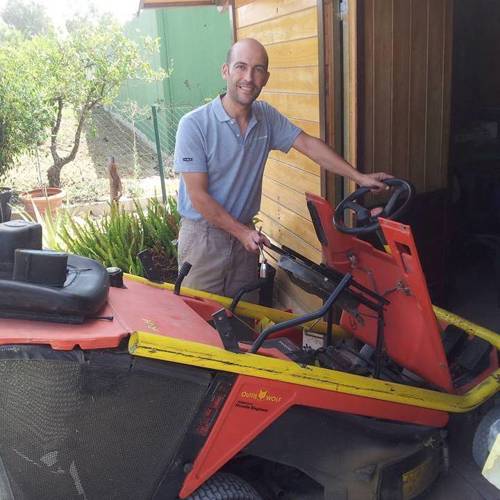
How has business been lately [mid-2021] for Spanish farmers and lawn care professionals?
The pandemic caused highs and lows for gardeners. In my area, gardening is mostly centred around parks, hotels and community, so when everything closed there wasn’t as much work. When it opened up again, things normalised.
The farming side of the business grew a lot in 2020. A lot of people moved from the city to the countryside to find freedom and safety, as it’s a healthier environment.
The business has stabilised. I imagine next year there’ll be growth again, as the brand new equipment people bought will require repairing and maintenance.
How has gardening and agriculture equipment changed since you started in the industry?
Professional gardeners have been investing in more specialised equipment and machines. Before, they’d have one machine to do multiple tasks. Increasingly, they’re getting specific machines for specific jobs. This means the job gets done more efficiently, takes less time and is more profitable.
I see the same in farming, though to a lesser extent because it’s carried out in stages. Gardeners go through a lot of clients’ gardens whereas farmers maintain their own fields. Gardeners have to work out how to be productive across those multiple jobs, while farmers can be more methodical and organised.
What are your biggest challenges at work?
People don’t know Kawasaki Engines here in Spain. A different brand may be more expensive and not as good, but if they have a strong marketing presence, the shop owner doesn’t need to convince the client to buy it. If a customer knows a brand they’ll stick with it and come back to it.
I have to convince my clients to buy machines that are powered by Kawasaki Engines. I’m honest and tell them the truth so they eventually understand the value of buying Kawasaki but it would be easier if Kawasaki Engines did more marketing here in Spain.
What are the biggest business issues in your local area?
Here in Andalusia, there’s a lot of ‘professional intrusion’: people who are not authorised or qualified professionals, but still do the work and get paid - usually a lot less than authorised professionals - leading to poor results and pushing down prices. They charge less by buying cheap equipment.
Professional repair and maintenance businesses need to charge more to offer a quality service; the non-professionals need to save money so they can charge less and undercut the professionals.
This is a very serious problem for this kind of business as it takes work from real professionals. The customers suffer as well, because they don’t get quality service. These people’s machines break down more, or are ill-serviced and eventually they come to me as a last resort when the damage has already been done. They end up paying twice for an issue that could have been solved easily - and less expensively - the first time around.
What’s the best piece of advice you would give a new farmer or gardener?
Buy quality professional equipment. And of course, I suggest Kawasaki equipment as it’s one of the best brands available.
Also, get professional qualifications and don’t allow non-professionals to try and fix your machines. Go to a professional who knows what they are doing, so it doesn’t become a bigger problem down the line.
You may be interested in
-
How will environmental legislation like ULEZ affect landscapers?

-
Help us shape our support for professional landscapers – take our survey today!

-
Kawasaki Engines parts and technical manager Jon Couling discusses the support network that keeps landscapers working year-round

-
Powered by Kawasaki: Introduction to Husqvarna

-
Kawasaki Engines Christmas Quiz

-
Iwan Jones joins the ranks of Kawasaki prizewinners winning a brand new multi-tool







